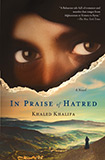Page 3 of 3
There are currently 17 member reviews
for In Praise of Hatred
-
Viqui G. (State College, PA)
In Praise of Hatred
In this novel I learned a lot about the conflict in Syria in the 1980's which has unfortunately spilled over into present day revolution and war in Syria today. For this reason I enjoyed reading the novel. However, I feel the female narrator of the story was not a character that was believable. Her attitudes were not realistic for an innocent 17 year old girl.
In general I find that male authors often cannot put themselves in a woman's mind and write a believable story as if they are a woman. I certainly believe this is the case with this novel. Khalifa writes a very descriptive political novel which evokes a time and place that is distinctive, but he is not successful at convincing the reader that the narrator is a real person. In fact most of the female characters were difficult for me to believe. They were often depicted as 2 dimensional and either reprehensible such as Marwan who was chained to her room for loving an inappropriate man, or almost saintlike like Saafa. I also found the story line disjointed and often confusing. The reader learns great details about a certain minor character, but then never hears about the character again. I enjoyed learning about the Syrian political conflict, but the characters in the novel were a disappointment.
-
Judith G. (Ewa Beach, HI)
Poor for me but maybe good for others
Even using the extensive list of main characters I found it difficult to follow the character lines. I would read a couple of pages and then find myself in 'another place' and would have to retrace to where I had begun reading. Perhaps I should give up on translated novels. I didn't enjoy this one.
-
Catherine M. (Mankato, MN)
In Praise of Hatred
Khaled Khalifa, author of In Praise of Hatred contends—in the book's forward written by Robin Yassin-Kassab—that he does not want us to read his book because he is an oppressed writer; rather, he asks that we read it because we are interested in the story and because we enjoy it.
First, I am interested in Middle Eastern life, religion, history, and politics while admitting that my understanding here is fragmented and woefully naïve. In all honesty, Khalifa's book served to increase my confusion, especially concerning the events leading up to and during Aleppo's war between Islamist rebels and the Mukhabarat and how this event fit into a larger framework.
Second, some men can write stories in a female voice; others cannot. I would put Khalifa in the later group. The unnamed narrator's lustful obsessions, for example, were not thoughts I would attribute to a woman's worldview. Therefore, I did not find the book enjoyable.
